|
|
|
Sort Order |
|
|
|
Items / Page
|
|
|
|
|
|
|
| Srl | Item |
| 1 |
ID:
071631


|
|
|
|
|
| Publication |
2006.
|
| Summary/Abstract |
This article examines how states attempt to overcome collective action problems for promoting regional integration, by highlighting such attempts by members of the Association of Southeast Asian Nations (ASEAN). It considers two kinds of collective action problems: collaboration games where actors are lured to defect from an agreement in order to obtain short-term gains, and coordination games where actors face difficulty in reaching an agreement. The article argues that although ASEAN countries have not intended to establish a supranational body to resolve collective action problems, they have gradually developed feasible enforcement mechanisms by intensifying the centralized nature of regional organization. It also contends that some member states have begun to play a focal point role in resolving coordination problems resulting from accelerated regional integration and market liberalization, and the resolution of coordination problems has been pursued in a framework where extra-regional countries and environments play a significant role.
|
|
|
|
|
|
|
|
|
|
|
|
|
|
|
|
| 2 |
ID:
148308


|
|
|
|
|
| Summary/Abstract |
This study examines conditions under which states in East Asia engage in the development of regional institutions. It assumes that crucial external events and shocks, which produce specific historical breakpoints – critical junctures – constitute a significant breakpoint at which the regional states willingly elevated a path to develop regional institutions to a new level. The analysis of the development of regional institutions for a free trade area and food stock for emergency revealed that regional states in East Asia changed their views on the evolving reality created by external shocks and such changes led to the creation of new regional institutions.
|
|
|
|
|
|
|
|
|
|
|
|
|
|
|
|
| 3 |
ID:
178857
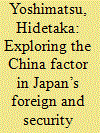

|
|
|
|
|
| Summary/Abstract |
In the new millennium, Japan's strategy for outer space has strengthened with growing concerns about North Korea's launching of ballistic missiles and China's enhanced space capabilities. The main aim of this research is to examine Japan's foreign and security policy in outer space and explore strategic implications in relation to China. The article argues that outer space has assumed an increasingly important position in the Japan-US alliance as Japan is playing an auxiliary role in enhancing the guarantee of the US mission assurance against China's space capabilities. It also contends that Japan has engaged in regional community-building through a multilateral space forum with open and horizontal character, which challenges China's aspiration to lead regional cooperation in outer space. Furthermore, this article offers the prospect of the extension of the quadrilateral security dialogue to the space field and the deepening of community-building through more commitments to human resources development.
|
|
|
|
|
|
|
|
|
|
|
|
|
|
|
|
| 4 |
ID:
079582


|
|
|
|
|
| Publication |
2007.
|
| Summary/Abstract |
This article examines Japan's evolving commitments to technology development and technology diffusion in Asia. It explores Japan's technology strategies in three areas-Internet protocol, open source software, and horology-focusing on the importance of technology standards. The development and diffusion of technology standards has become one of the core elements in establishing industrial competitiveness. The importance of technology standards encouraged the Japanese government and firms to pursue a regional policy to develop and diffuse new technological ideas and standards in Asia. Japan's commitments were accepted by its neighbors because they could obtain various benefits from collaboration with Japan, such as technological exchanges, technology transfer, and financial aid
|
|
|
|
|
|
|
|
|
|
|
|
|
|
|
|
| 5 |
ID:
173182


|
|
|
|
|
| Summary/Abstract |
This article examines Japan’s trade policy on significant geo-economic developments by focusing on its engagement in three large free trade agreements: the Trans-Pacific Partnership, the Regional Comprehensive Economic Partnership, and the Japan–EU Economic Partnership Agreement. Under the Abe administration, Japan has produced successful outcomes in mega-FTA strategy, concluding the Comprehensive and Progressive Agreement for Trans-Pacific Partnership and the Japan–EU Economic Partnership Agreement in 2018. The making and diffusion of high-standard rules were given high priority in Japan’s mega-FTA strategy, and Prime Minister Abe’s political leadership in employing his political allies and executive aides and managing the opposition activities of veto players has enabled his administration to produce these successful outcomes.
|
|
|
|
|
|
|
|
|
|
|
|
|
|
|
|
| 6 |
ID:
049191
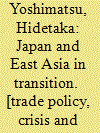

|
|
|
|
|
| Publication |
Hampshire, Palgrave Macmillan, 2003.
|
| Description |
x, 195p.
|
| Standard Number |
1403911606
|
|
|
|
|
|
|
|
|
|
|
|
Copies: C:1/I:0,R:0,Q:0
Circulation
| Accession# | Call# | Current Location | Status | Policy | Location |
| 047218 | 337.5205/YOS 047218 | Main | On Shelf | General | |
|
|
|
|
| 7 |
ID:
158735
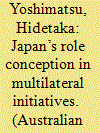

|
|
|
|
|
| Summary/Abstract |
This article examines Japan’s role conception in its multilateral commitments to the Asia-Pacific after the global financial crisis in 2008. The Hatoyama government launched an East Asian Community initiative, which aimed to assume a kingmaker role in creating a new order in East Asia. However, the East Asian Community initiative did not develop due to stress on self-reliance and distance from partnership with the USA. The Abe government sought to play a dual role in its major multilateral commitments. On the one hand, the government sought to play a follower role in enhancing the position of the East Asia Summit with an eye to consolidating the US-based institutional framework. On the other, Abe’s new multilateral initiative of the Free and Open Indo-Pacific represented Japan’s kingmaker role in maintaining a free and open maritime regime, and to keep a liberal and open economic regime under the emergence of the Trump administration.
|
|
|
|
|
|
|
|
|
|
|
|
|
|
|
|
| 8 |
ID:
190658
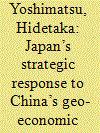

|
|
|
|
|
| Summary/Abstract |
In the new millennium, Japan found a renewed interest in infrastructure investment and engaged in this policy issue with diplomatic initiatives and external partnerships with due attention to China’s geo-economic presence. In formulating strategies for infrastructure investment, Japan has presented and disseminated a specific idea of ‘quality infrastructure’ as a principal component of its external infrastructure push. This article seeks to trace the evolution of Japan’s ideational principles for quality infrastructure and elucidate policy motivation, policy objective, and external influence. It argues that Japan’s advocacy of quality infrastructure derived from domestic impetus to expand infrastructure exports and external impetus to compete against China’s infrastructural push through the Belt and Road Initiative (BRI). Japan advocated quality infrastructure as a strategic tool to pursue multiple policy objectives that shifted from justifying Japanese infrastructural push to using as means to check and accommodate the BRI, and to legitimising common governance principles for infrastructure investment. In relations to external influence, Japan’s persistence in norm-setting encouraged China to incorporate normative principles first at business dialogues and then embed common governance principles in its policy approach to infrastructure investment.
|
|
|
|
|
|
|
|
|
|
|
|
|
|
|
|
| 9 |
ID:
113616
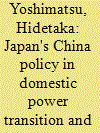

|
|
|
|
|
| Publication |
2012.
|
| Summary/Abstract |
The main objectives of this article are to examine the evolution of Japan's China policy in a power shift to the Democratic Party of Japan (DPJ) and to provide theoretical explanations for the evolution. The DPJ government showed accommodating postures toward China, and such postures derived from the DPJ leaders' particular preferences and perceptions as well as the party's aspiration for legitimating its power formation against the previous government. At the same time, political and security linkages with Washington constituted the baseline for Japan's evolving diplomatic intercourses with China. Neoclassical realism, which integrates domestic political factors with systemic political configurations, can provide valuable insights for explaining major aspects in the evolution of Japan's China policy.
|
|
|
|
|
|
|
|
|
|
|
|
|
|
|
|
| 10 |
ID:
153244
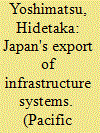

|
|
|
|
|
| Summary/Abstract |
This article focuses on the export of infrastructure systems as Japan's foreign economic policy that is unique in terms of diplomatic goals and means. It seeks to address how and why the Japanese government has strengthened commitments to expanding infrastructure exports to major Asian countries. This article argues that the Japanese government took advantage of developmental means of state-led initiative and institutionalised government-business collaboration in sustaining the export of infrastructure systems. It also contends that the Japanese government pursued, in the infrastructure export initiative, twin goals of creating a new growth engine to revitalise the Japanese economy and strengthening strategic links with Asian countries to balance China's regional influence.
|
|
|
|
|
|
|
|
|
|
|
|
|
|
|
|
| 11 |
ID:
100988


|
|
|
|
|
| Publication |
2010.
|
| Summary/Abstract |
This article analyzes Japan's motivations in opening negotiations on free trade agreements with Australia and Switzerland, highlighting intersections between domestic and international factors. While Australia is a security ally of Japan and a main source of natural resources, Switzerland is a traditional ally in World Trade Organization negotiations and considered a gateway to the European market.
|
|
|
|
|
|
|
|
|
|
|
|
|
|
|
|
| 12 |
ID:
061897


|
|
|
|
|
| Publication |
Mar-Apr 2005.
|
|
|
|
|
|
|
|
|
|
|
|
|
|
|
|
| 13 |
ID:
079068


|
|
|
| 14 |
ID:
160836


|
|
|
|
|
| Summary/Abstract |
While major arenas of Sino-Japanese struggle are maritime security affairs and political leadership in managing regional affairs, infrastructure development is emerging as a new source of rivalry. Given this new trend, this article highlights rivalry in the provision of regional institutions and programs to sustain infrastructure development and the winning of the Jakarta–Bandung high-speed railway project in Indonesia. It argues that in committing to infrastructure development, China and Japan were required to pay due attention to close connections with existing multilateral development banks and responses to the needs of a target government. Moreover, it contends that both states regarded commitments to infrastructure development as crucial vehicles to enhance political leverage and means to sustain the national economy and diffuse specific ideals for development.
|
|
|
|
|
|
|
|
|
|
|
|
|
|
|
|
| 15 |
ID:
172130


|
|
|
|
|
| Summary/Abstract |
Japanese Prime Minister Shinzo Abe has shown a keen interest in his country’s relationship with India with an intention to protect Japan’s stake in maritime affairs under the ‘Indo-Pacific’ concept. In evaluating Japan’s India strategy, a particularly important factor is China’s regional presence. This article, through an analysis of Japan’s India policy during 2013–18, seeks to address the following two questions. First, how has Japan’s India diplomacy under Prime Minister Abe in politics, security, and economics been influenced by its strategies towards China? Second, how can Japan’s diplomatic policies towards India be evaluated in terms of key concepts in relation to a state’s foreign policy responses? The exploration of the development of Japan’s India diplomacy, the geopolitical and geo-economic factors behind it, and the strategic nature of the diplomatic policies enables us to understand the prospect of increasingly important Japan–India relations and their strategic implications for rapidly evolving regional politics.
|
|
|
|
|
|
|
|
|
|
|
|
|
|
|
|
| 16 |
ID:
094990
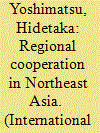

|
|
|
|
|
| Publication |
2010.
|
| Summary/Abstract |
Since the late 1990s, China, Japan, and South Korea - the core states in Northeast Asia - have gradually engaged in various initiatives and institutions for regional cooperation. Such initiatives extend from summitry to functional cooperation in finance, environmental protection, logistics, and other areas. Furthermore, the three countries have shown their willingness to vitalize cross-border economic activities by concluding commercial arrangements. Given these evolutions, this article seeks to address the following questions: what features are found in trilateral cooperative initiatives and how these features are evaluated in terms of 'regional governance'? The paper advances two propositions. First, regional cooperation in Northeast Asia can be characterized as weak neoliberal orientation and intensive business involvements in cooperative projects in state-directed policy networks. Second, regional governance in Northeast Asia has gradually intensified the nature of regulatory governance in which the governments of the three countries sought to harmonize standards and regulatory systems through trilateral cooperation.
|
|
|
|
|
|
|
|
|
|
|
|
|
|
|
|
| 17 |
ID:
092160
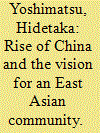

|
|
|
|
|
| Publication |
2009.
|
| Summary/Abstract |
This article seeks to explore how stable regional order under the possible community formation can be created in East Asia in moves towards China's ascendancy. For this objective, it takes advantage of a framework assuming that the development of an East Asian community would be possible under conditions that the states in the region develop common identity and norms, as well as multilateral institutions that guarantee the long-term interest. Moreover, the society needs to be involved in identity formation and institution-building. This article argues that China has been gradually embedded into formal multilateral institutions and less formal policy networks formed by state and non-state actors, which have been conducive to the creation of a regional community. However, both collective norms at the governmental level and shared cultural consciousness at the public level have not developed enough to have significant influences on directing China firmly to the formation of a regional community.
|
|
|
|
|
|
|
|
|
|
|
|
|
|
|
|
| 18 |
ID:
143691


|
|
|
|
|
| Summary/Abstract |
The main objective of this study is to elucidate great power politics in the Mekong region by exploring how China and the United States have committed to the development of Mekong countries and what characteristics are found in the commitments. The argument that this study advances is three-fold. First, China's pragmatic policies and close linkages with the Association of Southeast Asian Nations (ASEAN) have contributed to raising economic linkages and political leverage in the Mekong region. Second, the US commitments to Mekong development were characterized by advanced-nation-centered and ideal-oriented, which did not necessarily lead to strengthening political and economic linkages between the United States and Mekong countries. Third, while the US Mekong policies have gradually become more practical by paying attention to infrastructure development with strengthened linkages with ASEAN, the United States needs to advance policy harmonization with Japan and search for dialogue with China in pursuing combined objectives of governance and geopolitics.
|
|
|
|
|
|
|
|
|
|
|
|
|
|
|
|
| 19 |
ID:
149060
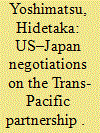

|
|
|
|
|
| Summary/Abstract |
This article explores which factors influenced the process of US–Japan negotiations on the Trans-Pacific Partnership. It argues that while pressures from major societal groups and legislative members hampered progress of bilateral negotiations, state leaders’ preferences for reacting strategically to geopolitical and geo-economic developments played a catalytic role in propelling the negotiations.
|
|
|
|
|
|
|
|
|
|
|
|
|
|
|
|
|
|
|
|
|